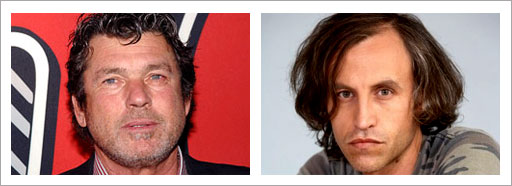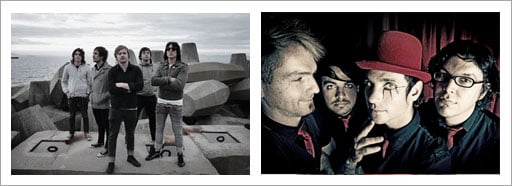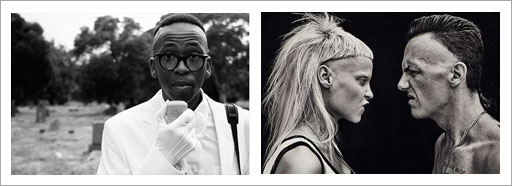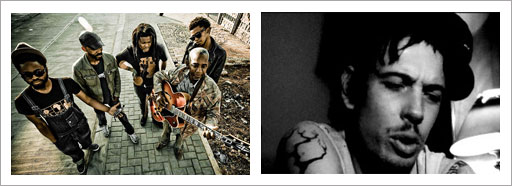Rolling Stone South Africa: the first in-depth interview

A few weeks ago, there were only rumours and a Facebook page that came across as a hoax. But now, apart from following @rollingstonesa on Twitter, you can go to RollingStone.co.za and be welcomed by a timer counting down the seconds to the first issue. The date: Saturday 19 November - a day that will be recalled repeatedly in the history that follows.
Presently, there are two prevailing questions everyone wants to know: "How do I get my music inside RS SA?" and "Can I come work there?"
Why do we need yet another American brand?
But there's a more important question: why do we need Rolling Stone, yet another American brand, to elevate the status of our culture and improve our qualities and values?
In Long Walk to Freedom, Nelson Mandela likens the alliance between the ANC and the SA Communist Party to the Allies' alliance with Stalin against Hitler, and concludes: "Who is to say we weren't using them?"
Whatever the answer, one thing is clear: our music and cultural status has taken a huge leap forward.
Jann Wenner, who founded Rolling Stone in 1967 at the age of 21, wrote in the first issue: "We have something here... for every person who 'believes the magic that can set you free'. Rolling Stone is not just about music, but also about the things and attitudes that music embraces... To describe it any further would be difficult without sounding like bullshit, and bullshit is like gathering moss."
But, in an effort to satisfy curiosity, and because we always want to know more, Johann Smith and Ruth Cooper of Bizcommunity.com's BizLounge spoke to Miles Keylock, editor-in-chief of Rolling Stone SA.

Ruth Cooper: So how's it all going?
Miles Keylock: Fantastic. We've been having people beating down our doors to write and shoot for us.
Johann M Smith: You must be bombarded with band's emails.
Keylock: SMSes, calls, listen to this, this and this. But we're not dismissing anything.
Cooper: Okay, let's start with the basic details: how many pages, what's the cover price, what are your launch party plans and who's going to be on the cover? Rumours say Die Antwoord and another source said it's going to be conceptual.
Keylock: 160 116 pages, R39.95. Launch party details we're keeping close to our chest - it will be something unusual and hopefully, an exclusive collaboration between some very interesting artists. As for the cover you'll have to wait and see. It will be a South African artist. Your question does give an indication...
Smith: Tell us, off the record?
Keylock: Not even off the record. That one is under lock and key. Funnily enough, if you look at the legacy of RS, the covers always featured icons or young visionaries, who are changing the music world or current affairs landscape. So it's going to be one of those.
Cooper: How did, and do you choose contributors?
Keylock: It's about the passion, commitment, and focus - this isn't just a job that pays rent. Currently, we don't have that much space. Unlike newspapers that cut and edit a writer's copy from, let's say, 5000 to 1000, and throws the rest away, I say no, this is where we start talking. A thousand words can be printed in a newspaper, but let's actually look at the real story that can be fleshed out.
Smith: I think it's very obvious on who would choose to contribute. It's clear who works hard in this industry and who doesn't. How much do you pay contributors?
Keylock: We don't obsess about how much we should pay per word. We discuss it beforehand and ask them, How much do you want to be paid? Honestly."
Cooper: RS SA plans on splitting international and local content 50/50. Is that going to be the average?
Keylock: It's a 50/50 split to begin with. In the first issue we're actually looking at a 60/40% split, towards SA music. We're never going to go below 50/50; most times we'll be [erring on] the side of SA content. It's very important to understand that we'll only be running 'premier syndicated content' in RS SA that has resonance with audiences in SA.
Cooper: Will overseas content only come from the original RS in America?
Keylock: RS is in 15 countries, in places like Chile, Argentina, Japan, the whole of Europe, Australia and Russia - it's important for us to fit into that global network. We won't just be syndicating international content because we can - we'll be able to hand pick 'prestigious articles'.

Cooper: How much power and say does RS headquarters have over you?
Keylock: In terms of selection of content - none. In terms of editorial integrity - a big yes; it's more important than anything. The magazine has to be of a certain quality. Anything that doesn't meet up to those standards we can't run. Because, you're going to be reading material that you won't get anywhere else in SA.
Cooper: What if there's a disagreement?
Keylock: In terms of editorial, just to clarify, it's completely our choice - we don't need to discuss it. Everything goes through their thumbs-up. Only because, of things like RS's chief photography, made famous by photographers like Annie Leibovitz - we're talking about photographers who are the top of their game, and we have to reflect that. That's why we chose someone like Pieter Hugo, who is already an internationally acclaimed photographer.
So, it's about raising the level. In whatever we do - it has to be the best that we can do. There's no question of sub-standard content of any nature whatsoever. And that is the ethos from RS around the world. We all tap into that. Let's make this something special.
And, as I've been telling people, it was fascinating for us to go over and attend the international RS conference recently, held every two years. We got to meet all the editors, publishers, designers from every RS around the globe. The thing that impressed me, everyone is happy. There's no baggage. Everyone is amped to be a part of the RS family.
And it is a family. It isn't corporate, it's still independent. And we were welcomed into the family.
Smith: But it's not independent, it belongs to Wenner Media.
Keylock: Jann Wenner has been independent from day one. Fiercely independent. And he is fiercely devoted to print. That's important and should be communicated to your readers.
Jann said something quite beautiful to me: "Sure, everyone is saying: why print in this day and age? The Internet is great, but it's another beast all together," and concluded: "The internet you surf, print you dive into."
Smith: Internet is mostly part of a disposable culture.
Keylock: You've given the answer. The Internet is a different way of communicating.
Cooper: I get that, I just think that the shift is going to move more. As sad as it is, I believe there's going to be less interest in print in the future.
Keylock: Another thing Jann said that struck a major chord: "When meaningful stories are written by somebody who has an opinion, about something that isn't tabloid driven, for a reader who may, or may not relate, you will find your audience".
RS has built its reputation publishing in-depth long-form investigative journalism. The Internet does not have space for that. People have low attention spans - If you can believe Nielsen's SoundScan* and statistics, 56 seconds per page. Nobody's reading, they're only getting sound bytes.
Smith: I agree with you and Jann. To me, print is sentimental, it engages our four senses. However, in SA, we have several languages, a bad rep for illiteracy - and RS USA doesn't use paragraph breaks - and there is less long-form journalism around in magazines today. Do these things animate you about the medium? Or is it worrisome?
Keylock: There are small technicalities. One can bite into any type of negativity. Worry about what? Worry about what you're doing. Which is creating the best magazine that you can, this is what was communicated to us very strongly, when we went over to have our first conversation. And it was just a conversation, no pitches or presentations - we talked, and talked.

Smith: Did you contact them or did they contact you?
Keylock: We contacted them. They replied to us saying, "You guys are passionate." It was simple as that. And that's our focus: what we're passionate about. Let's make it happen. It's here. We're having conversation with everybody in SA who wants to make this happen. And if you don't want to help us - we're not talking to you.
Cooper: What will the variety and split of SA music genres be?
Keylock: That's a fantastic question. What we want to do is bring conversations together. In one space. That hasn't happened in print, for whatever reasons.
The history of SA print in the last decade has been about divide and conquer. About preaching to a boutique demographic that cater to advertisers' interest, and how they portray you. We say, "No, let's bring everybody together. Here's a space." Real criticism, not advertorial blurbs. I mean, we've got 10 pages of album reviews, not a text block on a page.
Smith: The average word-count, of each review, should surely then be over 300 words?
Keylock: We have a variety, from 100 to 500. The culture of criticism has dwindled over the years; it doesn't help anyone. It doesn't sustain any so-called scenes. There's a great corrective we can start introducing. Giving the variety of amazing musical forms we have, representative air time in a meaningful way.
Smith: SA has good genres, and god-awful ones [that we keep locked up in a closet buried in the Northern Cape].
Keylock: If Kurt Darren does something with attitude, then maybe. Currently, probably not. He's not a rock animal.
Smith: There is no meaning behind that music.
Keylock: Yes. Again, it comes down to the editorial integrity and also the artists. A RS writer once wrote, what is rock? It's not a genre...
Smith: It's a religious conviction.
Keylock: ...It's an attitude. A way of affirming life. Who are our rock stars? Who are the guys who are prepared to die by the sword, their own sword?
Smith: Unless it's Fokof or Parlotones, local music and art are rarely part of a consumer's top-of-mind awareness. How does RS SA intend to overcome the familiar nuisance of re-introducing musicians and artists, to the reader in each and every article/review/interview?
Keylock: By giving writers enough space to explore history. Currently a music feature is like what, if you're lucky, 800 words in print. What can you actually get to know? It makes the present perpetual. An automatic state of now.
If you do an article or interview, it's only ever about the band dropping an album and why it's cool. You don't know where they come from, their real influences - you can't trace a lineage back to anything. It creates a culture of amnesia. You all know the story.
[reaches for a cigarette while looking at Smith, who offers a lighter] Thanks.
Smith: I had a similar experience with a recent article I wrote on Taxi Violence. A bigger issue is that culture and art are not as commercial in our borders, and resources are severely lacking. Will RS help in that regard, help out bands who want to record or make a video but lack funds?
Keylock: Those are opportunities we're looking at. We will be starting RS sessions. From gigs to recordings, however that might manifest itself. Which is why we're based where we are [ The Planet Art in Cape Town]. There are three recording studios in this block, one being Red Bull Studios.
Smith: Is Red Bull one of your advertisers?
Keylock: No, but there's partnerships. We're working with a lot of brands to see how we can make it happen.
Cooper: Are you involved in other kinds of corporate social responsibilities?
Keylock: An important part for us, and certainly for me, is nurturing home-grown talent over the next year, and several years. Is to kick-start an international RS intern-exchange programme. Fifteen other territories across the world - it doesn't take brain science to f*cking go, "Here's an opportunity to do something special."
Smith: Are you going to help out with music research? The last thorough research was in 1998. And the most recent, conducted by Moshito Music Conference and Exhibition, was the first real examination of live music, and the conductors admitted it was only the tip of the iceberg...
Keylock: We are open to it. These are conversations that need to happen. We're open to people coming to us for help. Everyone is fighting in their own block. We're saying it doesn't have to be that way.
Smith: Despite that, don't you think it's presumptuous that RS SA claims to be the voice of SA? You haven't even launched, you're only planning on printing 30 000 issues in a country of 50 million people, and as far as we can tell, it will only be available in English.
Keylock: We can get bogged down by that. Analyse it until it becomes redundant. That's on the rate card for a reason.
Smith: What is that reason?
Keylock: Who reads rate cards?
Smith: Advertisers.
Keylock: H-ello. That's all that it's about.
Smith: But, even for them, that still doesn't answer the question.
Keylock: I think we have to become that. That's our aspiration.
Cooper: How exactly is that going to happen?
Keylock: By respecting our artists; it's that simple. By giving them air time and space in a broader sense. There's a reason why SA artists are currently outselling international artists in SA. There's a reason why we're going through this amazing musical explosion and have been. There's a reason why our artists are touring globally and make headline - artists from all genres. Like Spoek Mathambo, who just signed to Sub Pop, the first label Nirvana signed to.
Smith: It's not completely fair, Miles. Like Spoek, Die Antwoord signed to US label Interscope; Kwaito beats and dance moves are being exploited by Beyoncé. And the Americans gave us our biggest celebrity, Charlize Theron. Do you think it's become a case of global, not local, capitalism, not ubuntu? Don't you feel cheated?
Keylock: I can mash my teeth about it, but the reality is, those artists that you mention, didn't get representative space that they should have gotten from local media.
Smith: What then, does it truly mean to "to die by the sword, their own sword?" More artists should struggle for it here.
Keylock: Yeah, now there's an opportunity for them here [points finger to ground] that gives people representation. Let's not complicate things; they are currently not covered in SA. Because, when they are, they are stuck into little boxes. And it's the kind of writing about them, that's important: the animation and passion that artists have to share. Why the hell aren't you amped about any artists?
Smith: I am extremely amped. I have freelanced for every independent music publication in Cape Town; I love our artists. Take BLK JKS for example, they're successful, and they're doing it here. I find SA acts, who found success through international channels, grossly, grossly unjust, Miles.
Keylock: There a reason why, let me call him by his new name, Ninja, masturbated his SAMA award live. It might have been a tossed-off line, but what he said was, its overseas that made him big.
BLK JKS is the most interesting band from the last decade. Because they are prepared to walk to the edge with their sound, tread that tight rope where everything might just fall to shambles.
Smith: It's seems like an easy escape. We need people like Ninja and Spoek to make it big and establish SA music.
Keylock: It sounds like you got a whole story you need to write about that.
Smith: In a 2008 article, you wrote: "Even a cursory glance through the new English rock bands on the scene firmly situates the genre in a global, commonwealth context. Cool? Hell yes! South African? Well, sure, but only by geographical default." Why do we always need a superpower to help us out?
Keylock: It's a damn good question. We have to have enough humility, to know where we are. And if we need help, we don't have to pull down our pants. We can humbly ask for that help, and receive it.
Cooper: I think there is a way to do it, without feeling used by America. Artists can benefit from overseas exposure; do we really only want to keep them to ourselves?
Keylock: Talking of that, we'll be syndicating content to RS magazines around the world. So, they don't have to waste their time trying to understand the context of our musicians.
Smith: If you gave 21-year-old Jann Wenner the exact same opportunity you have been given, do you think he would have been as successful?
Keylock: It's important that RS came out of 60s' culture - a culture that tried to re-imagine the future. Over the years Jann has stuck to the basics. There was a brief time when they tweaked RS, but they went back. He is a visionary.Smith: What exactly is the pulse of music that RS SA speaks of?
Keylock: It's about all these conversations we're having.
Cooper: RS USA, however, does claim to be the pulse of youth, not music. Why is that?
Keylock: America is more youth-driven. Their market is different to ours. What is youth? We can say it's that mystical 16-to-24-year-old that every advertiser wants to get into bed with. Or we can say it's anyone who is young at heart.
Cooper: The rate card doesn't mention specific audiences. What is your target market?
Keylock: Anyone who is passionate about music and current affairs.
Cooper: There are many diverse races and cultures; not everyone cares about current affairs and is passionate about music. How do you appeal to them?
Keylock: By writing passionately about music and current affairs.
Smith: Are you going to have brand campaign to reach them?
Keylock: [nods] Brands Rock is our marketing company; they do Levi's. We have an entire campaign we're rolling out in the next 18 months. There will be a variety of activation, festivals of all natures. From our initial launch, to quite something special.
Cooper: [RS is well-known for dealing with politics, which is a contentious issue in SA and the Government [may eventually have the power of the Protection of Information Bill (POIB)]. How are you going to navigate that area?
Keylock: Again, we can get bogged down in all these concerns. Where we are at the moment, is where we are at the moment. We're not going to go, "Aaah, we're not going to that, just in case." Let's start with what we can do, and take it from there.
What is most important is music and politics go hand-in-hand in SA. That's why RS was started. Both our president and our youth league president have songs. Come on, the mix is obvious, for goodness sake [bangs hand on table].
Cooper: But how do you think music can change politics?
Keylock: Have you listened to music lately? Music is the one thing that brings people together and crosses all barriers.
Smith: The greatest form and shape of toyi-toyi and one that doesn't require subscription to any social club, political party or army.
Cooper: But are the people who need to hear it the most listening? And those who listen are they interested in politics?
Keylock: There's more than enough people desperate to listen, even if they aren't at the moment. It all comes down to the content you share. Even if that content opens up a small glitch in this matrix we are living, we're winning.Smith: What would the veritable heaven of music be in SA?
Keylock: I think we're in heaven at the moment.
Smith: It still sucks, in any real kind of sense. There's not even a solid infrastructure.
Keylock: Cross-pollination is the key. Like promoters being a bit more ambitious about the concerts they stage. It is happening. Oppikoppi is doing well. A few years ago there were only one or two festivals. That's growth. And today, no festival gets away with just one genre.
Smith: Moshito's research states: "The music sector plays a particularly important role in national economic development and social cohesion". And RS SA claims it "believes in music as a unifying force, bringing together black and white in both big city metropolises and small dorps." How are you going to appeal and reach audiences in townships?
Keylock: We are in talks with people who are already servicing that community, regarding alternative distribution methods and in terms of providing music there.
Smith: Will RS ever be available in other languages?
Keylock: Only in English, for now.
Cooper: Do you think people, who reside in townships, can afford to spend 39.95 on a magazine?
Keylock: I think so. It's accessible enough. Even cheaper if you subscribe. We are not going to be arrogant and say we have a formula. Serendipity is going play a major part. Let's all learn how we can make something special - you can say if it's cheesy, but why not?! Let's give it a bash.
Smith: The music, culture and moments that made RS USA special was unplanned and organic - much of it seemed serendipitous. I'm enjoying this interview. I'm going to try and stay as long as I can. It's not every day you get to interview RS magazine.
Keylock: I do hope not [everyone laughs]. Another thing is the idea of an interview. What is it? It's just a chat.
Smith: That's not always the case with bands. Sometimes they kinda sit there waiting for the next question.
Keylock: Yeah [smiles reminiscently].Smith: Having been a music journalist, did you ever feel no one was listening, that what you wrote meant nothing?
Keylock: I always thought, as long as I communicate the passion I have for an artists and the respect - the latter is a key one.
I remember in early 2010, when I had the opportunity to hang-out with Henry Rollins for three hours. During lunch and talking sh*t, he told me he was really pissed off. Because, he had just come out of a radio interview, and they didn't know who he was - other than the stop-start-let's-talk-about-nothing. He let them have it and tore their ears off.
A lot of Kwaito bands have been under the cosh with that. There are a lot of these stories. Respect the artists and, if you actually have something to talk about, then talk about it.
Smith: Did you ever consider starting your own magazine?
Keylock: Any music journalist has. It's about imagination and timing and going, "Oh my god, let's revisit that again." RS has been approached by several corporates over the years; they have a different agenda. It works from them. But I say, let's not be obsessed with percentage points. You can relate, you're a music journalist; you are not doing it for the money.
Smith: There is no money.
Keylock: You know! [laughs] It's about the affirmation of your passion for a band. That sustains you.
Smith: I think you would rather be inspired by Jann instead of approaching him.
Keylock: We might as well have. But RS has five decades of integrity. And why reinvent the wheel?
Smith: A certain air and ideology surrounds RS. No one really views it beyond the poetry of those five decades. To me, the real challenge will be to rid the magazine of that, and make this the RS that matters to us.
Keylock: Hopefully, when people see the first couple of issues, we'll allay all and any fears.
Cooper: Many people have that. Kind of what's currently happening with Playboy SA. People compare it to the original.
Keylock: That's why we have to keep the quality high.
Smith: You can still speak from a grass root level. But you've only ever written for M&G, GQ etc. Why haven't you ever contributed to Muse, YourLMG or Mahala?
Keylock: It's a question of time; you have to make a living and choose certain publications you write for. I didn't have any. I think Mahala has carved a fantastic space online; kudos to them. And what Mike Smith [YourLMG publisher] has done, from nothing, is great.
Smith: Would RS ever consider helping struggling publications?
Keylock: If there was a way that we could, yeah sure. We're open. We don't want to shut anybody down.
Smith: Jann Wenner once said: "You could compete with Rolling Stone if you wanted to... [But] I'm not gonna tell you." Do you think any such competition exists?
Keylock: I will never try to get into a competition mindset - it takes away from our focus.
Smith: What would your 20-year-old self say about all this?
Keylock: Probably not a word - he would just smile.
Smith: Parents always dread the day their child starts a band. How did your parents feel about you wanting to become a music journalist?
Keylock: They said you won't make a lot of money, but do what makes you happy.
Cooper: What about your fiancé of 11 years?
Keylock: She is a fiction writer and works 18 hours a day. She's an inspiration.
Smith: It's fortunate she's busy, so that we can look forward to a good RS.
Keylock: [laughs]
Smith: Relationships are tough for a music journalist. And the hours chaotic. You probably wake up at 10 like most of us.
Keylock: Hell no, 5.30am every morning.
Cooper: What is your dream for RS SA; what is the ideal response?
Keylock: Sustainability. Us having this conversation in 10 years' time.
Smith: The current, and oh-so-familiar, state of affairs caused a lot of musicians and writers to give up. Did any of us, and the great and promising Rolling Stone, miss out on any great talent or moments that saddens you?
Keylock: So much.
Smith: Names?
Keylock: [looks down at table and starts to speak in a soft sentimental tone]. James Phillip and Bernoldus Niemand - he never received the respect he deserved. Maybe, we'll be able to give him something, in some way... So many of our artists who have died... A great catalogue of musicians... Even someone like Lebo Mathosa... you know...
Who else..? There's so many in our history... Koos is one of them. There are a lot of archival material and current scenes that we're presently missing. Purely because they never had any space to evolve in the public domain. We're in danger of missing Felix Laband altogether; he's disappeared off the radar...
There's a past of wonderful guitarists that need to be told. If you listen to BLK JKS, and don't hear a Philip Tabane influence, it's an indictment of where we are the moment... Miles Davis tried to get Philip into his band, because he thought he was the Jimi Hendrix of his generation... But Philip only plays when his ancestors are talking to him. I mean... my god, why are these stories not being written?Smith: Do you think SA will [birth] the next Chuck Berry or Patti Smith?
Keylock: Wow... Umm... I'm always wary of 'the next'. Those artists are rare for a reason. There's a question mark over Die Antwoord; they can be bigger than they are. And there's a reason why Liquideep and Spoek have been nominated for Mobo Awards. That wasn't possible three years ago.
We haven't even gotten to our jazz artists, who have always been up there - if not ahead of the curve. There's a whole melting pot, a treasure chest, if you like, that needs to shared... God knows what can happen. Amazing things can.
Smith: Can we look forward to another golden chapter in rock & roll history?
Keylock: It's coming. It's just a matter of weeks and months. At the moment, the SA music and political landscape is changing daily. That's what makes it so tight. A lot of the marketing around, let's call it, 'Brand South Africa' is starting to crumble [and probably partly why the new Brand Council of South Africa has just launched - managing ed]]. People are starting to question it; it's necessary. And musically that's been reflected. That's why it's so exciting. That's why now is the right time.*An info and sales tracking system considered the official method, of tracking music and video products throughout the US, and source of sales records in the music industry.
Number of pages corrected at 4.10pm on 14 October 20111.
About Johann Smith
View my profile and articles...